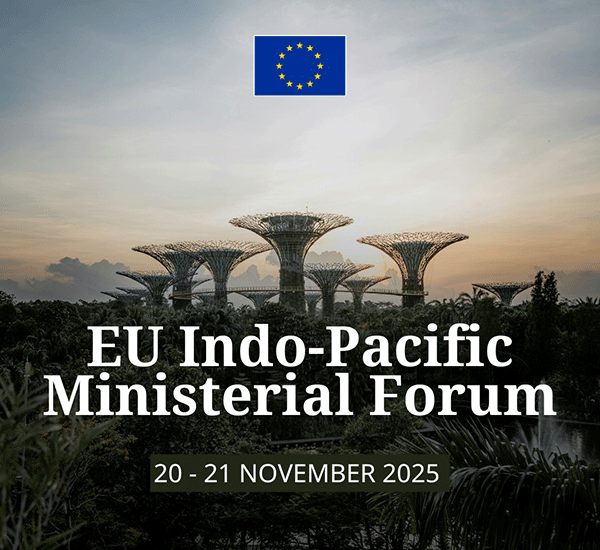|
Europe and the Indo-Pacific: Partners for a Resilient Future
Europe and the Indo-Pacific are working closely together to support shared growth, resilience and sustainability, bringing people, trade and the environment together across continents.
Since the European Union launched its Strategy for Cooperation in the Indo-Pacific in 2021, Europe’s presence in the region has grown stronger and more engaged.
Four years on, the strategy serves as the backbone for partnerships that promote prosperity, sustainability and stability. This week, ministers from the 27 European Union Member States and more than 70 countries from Asia and the Pacific are meeting in Brussels at the 4th EU Indo-Pacific Ministerial Forum, with Foreign Minister Thongsavanh Phomvihane representing Laos, to discuss ways to deepen cooperation.
A key focus of the Forum is protecting vital maritime infrastructure. The EU High Representative is leading a high-level event on safeguarding sea lanes and undersea networks that underpin global trade and connectivity. Naval activities and regular security dialogues aim to ensure freedom of navigation and stronger maritime security from Europe to the Indo-Pacific through the Red Sea.
Economic engagement remains a cornerstone of EU-Indo-Pacific ties. The European Union has signed trade agreements with Japan, South Korea, Singapore, Vietnam, New Zealand and Kenya. Negotiations with Indonesia are complete, and discussions with Australia, India, Thailand and the Philippines are progressing.
As Laos prepares to graduate to a middle-income country, the EU will extend zero-tariff access for three more years and is ready to offer the most generous trade arrangements possible thereafter.
The EU’s Global Gateway initiative is helping deliver sustainable, high-quality infrastructure. In Laos, projects promote green growth, inclusive trade, investment, capacity building and local skills development. They also support governance improvements and help Lao businesses expand regional trade opportunities.
Climate and environmental partnerships are another priority. The European Union supports the 2050 Strategy for the Blue Pacific Continent, advances Green Alliances with Japan, the Republic of Korea, the Philippines, Kenya and 15 Pacific Island countries, and backs Just Energy Transition Partnerships with Indonesia, Vietnam and South Africa. These efforts promote renewable energy, biodiversity protection and progress toward net zero emissions by 2050.
People-to-people connections strengthen these partnerships. Since 2021, over 23,000 students and professionals across the Indo-Pacific have benefited from EU-funded exchanges, including Erasmus+, mobility and research programmes. These initiatives build trust, foster friendship and help communities gain new skills.
The EU’s engagement is guided by respect for the multilateral system, international law and the United Nations Convention on the Law of the Sea. Sovereignty and territorial integrity remain central, ensuring stable and peaceful cooperation.
In a rapidly changing world, European and Indo-Pacific nations are demonstrating that collaboration, shared opportunities and long-term partnerships can support stability, resilience and prosperity for all. The Indo-Pacific Ministerial Forum in Brussels offers a platform to deepen cooperation and turn shared ambitions into reality.
By Mark Gallagher
(Latest Update November 20, 2025)
|


